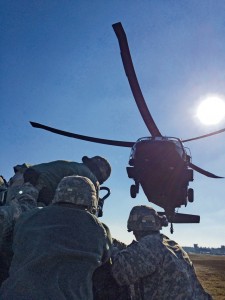VILSEK, Germany — An early wake-up call at 4:30 a.m. Feb. 23 brought attention to Soldiers from headquarters, 421st Medical Battalion (Multifunctional), for an “alert to deploy” to conduct Expert Field Medical Badge operations in Vilsek, Germany, more than 460 kilometers from their Baumholder home.
With the high operational tempo of many U.S. Army Europe combat support units, commanders seek creative solutions to maintain proficiency in their expeditionary and wartime tasks. Tasked to provide mission command and to run the 2015 Army Europe Spring Expert Field Medical Badge competition, the Baumholder, Germany-based 421st Medical Battalion took an opportunity to sharpen deployment operations tasks through a multi-model deployment in Vilsek.
“It starts with the basics,” said Lt. Col. Roy Vernon, 421st Medical Battalion commander. “The Army has been focused on combat operations for the last 14 years. We have forgotten a lot of the basic fundamentals of warfare. These (deployment) exercises are just what we need to re-establish the baseline to ensure we can ‘fight’ tonight.”

During the exercise, the battalion conducted typical pre-deployment operations to include medical and personnel processing, legal preparations of wills and powers of attorney as well as loading all of the equipment required for an early entry element, (the portion of the battalion headquarters designated as the mission command element for the EFMB). Following an eight-hour convoy movement, the unit arrived at an Intermediate Staging Base, or ISB, in Vilsek. The site’s design replicated the ISBs found in places such as Kuwait; Mihail Kogalniceanu Air Base, Romania; and Manas, Kyrgyzstan. Though many of the Soldiers in the battalion do have combat experience with real ISB operations, there are several younger Soldiers in the unit who do not.
After a nights stay at the ISB, the unit conducted a tactical sling load operations via a UH-60 Helicopter supported by the Blue Stars crew from Alpha Company third Battalion, the 158th Aviation Regiment. This was followed by convoy operations into the operational area. It was the first time Soldiers had operated around military helicopters.
“The sling load training was a huge adrenaline rush,” said Spc. Darrell Stidham, a combat medic and native of Milton, Florida. “This was my first experience with hooking equipment underneath a UH-60. The instructors were very knowledgeable and helped prepare me for any instance where I may have to conduct this type of operation.”
Sgt. Maj. Felix Infante, operations sergeant major for the 421st Medical Battalion, said how training and deployments go hand-in-hand.
“We alert, we marshal and we deploy to an ISB before deploying to a combat zone,” he said. “It looks and feels just like this. We do this here, so we are ready for it when we go to the fight.”
The 421st Medical Battalion will host 150 Soldiers from U.S. Army Europe and 30 additional service members from various NATO countries at the upcoming spring EFMB competition. The candidates will be given a chance to earn one of the U.S. Army’s toughest badges: the Expert Field Medical Badge. In 2014, only 19 percent of the Soldiers in the Army earned the EFMB, making the badge a distinctive mark on Soldiers’ uniforms and records.
The EFMB training starts March 15 with an opening ceremony and continues with a week of standardization activities to ensure candidates are clear on the strict standards of the EFMB test. Testing begins Sunday, and the culminating event, a 12-mile foot march, is scheduled for March 27.


